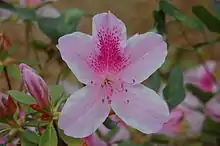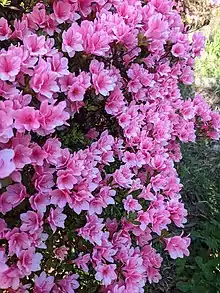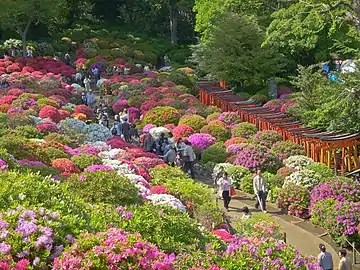Azalea
Azaleas (/əˈzeɪliə/) are flowering shrubs in the genus Rhododendron, particularly the former sections Tsutsusi (evergreen) and Pentanthera (deciduous). Azaleas bloom in the spring (April and May in the temperate Northern Hemisphere, and October and November in the Southern Hemisphere),[1] their flowers often lasting several weeks. Shade tolerant, they prefer living near or under trees. They are part of the family Ericaceae.

Cultivation

Plant enthusiasts have selectively bred azaleas for hundreds of years. This human selection has produced over 10,000 different cultivars which are propagated by cuttings. Azalea seeds can also be collected and germinated.
Azaleas are generally slow-growing and do best in well-drained acidic soil (4.5–6.0 pH).[2] Fertilizer needs are low. Some species need regular pruning.
Azaleas are native to several continents including Asia, Europe and North America. They are planted abundantly as ornamentals in the southeastern US, southern Asia, and parts of southwest Europe.

According to azalea historian Fred Galle, in the United States, Azalea indica (in this case, the group of plants called Southern indicas) was first introduced to the outdoor landscape in the 1830s at the rice plantation Magnolia-on-the-Ashley in Charleston, South Carolina. From Philadelphia, where they were grown only in greenhouses, John Grimke Drayton (Magnolia's owner) imported the plants for use in his estate garden. With encouragement from Charles Sprague Sargent from Harvard's Arnold Arboretum, Magnolia Gardens was opened to the public in 1871, following the American Civil War. Magnolia is one of the oldest public gardens in America. Since the late 19th century, in late March and early April, thousands visit to see the azaleas bloom in their full glory.

Classification
Native American azaleas
Disease
Azalea leafy gall can be particularly destructive to azalea leaves during the early spring. Hand picking infected leaves is the recommended method of control.[3]
They can also be subject to Phytophthora root rot in moist, hot conditions.[4]
Azaleas share the economically important disease Phytophthora cinnamomi with more than 3000 other plants.[5]: 199
Pests
Azaleas share the Azalea lace bug (Stephanitis pyrioides) with many other heath species.[6] Shrewsbury & Raupp 2000 find azaleas can be protected from them by companion planting with an overstory above them.[6]
Cultural significance and symbolism
In Chinese culture, the azalea is known as "thinking of home bush" (sixiang shu), and is immortalized in the poetry of Du Fu.
The azalea is also one of the symbols of the city of São Paulo, Brazil.[7]
Azaleas and rhododendrons were once so infamous for their toxicity that to receive a bouquet of their flowers in a black vase was a well-known death threat.[8]
Toxicity
In addition to being renowned for its beauty, the azalea is also highly toxic—it contains andromedotoxins in both its leaves and nectar, including honey from the nectar.[9] Bees are deliberately fed on Azalea/Rhododendron nectar in some parts of Turkey, producing a mind-altering, potentially medicinal, and occasionally lethal honey known as "mad honey".[10] Azalea is danger to pets. If the poison from azalea flowers and leaves enters a cat's stomach, it can cause central nervous system depression, which in turn can lead to multi-organ failure. Symptoms may include vomiting, diarrhea, seizures, laryngeal edema and heart rhythm disturbances, which can lead to complete cardiac arrest and therefore death. Acute kidney failure may also occur.
Azalea festivals

Japan
Motoyama, Kōchi has a flower festival in which the blooming of Tsutsuji is celebrated. Tatebayashi, Gunma is famous for its Azalea Hill Park, Tsutsuji-ga-oka. Nezu Shrine in Bunkyo, Tokyo, holds a Tsutsuji Matsuri from early April until early May. Higashi Village has hosted an azalea festival each year since 1976. The village's 50,000 azalea plants draw an estimated 60,000 to 80,000 visitors each year.
Korea
Sobaeksan, one of the 12 well-known Sobaek Mountains, lying on the border between Chungbuk Province and Gyeongbuk has a royal azalea (Rhododendron schlippenbachii) festival held on May every year. Sobaeksan has an azalea colony dotted around Biro mountaintop, Gukmang and Yonwha early in May. When royal azaleas have turned pink in the end of May, it looks like Sobaeksan wears a pink Jeogori (Korean traditional jacket).[11]
Hong Kong
The Ma On Shan Azalea Festival is held in Ma On Shan, where six native species (Rhododendron championae, Rhododendron farrerae, Rhododendron hongkongense, Rhododendron moulmainense, Rhododendron simiarum and Rhododendron simsii [12]) are found in the area. The festival has been held since 2004; it includes activities such as exhibitions, photo contests and carnivals.[13]
United States

Many cities in the United States have festivals in the spring celebrating the blooms of the azalea, including Summerville, South Carolina; Hamilton, New Jersey; Mobile, Alabama; Jasper, Texas; Tyler, Texas; Norfolk, Virginia;[14] Wilmington, North Carolina (North Carolina Azalea Festival);[15] Valdosta, Georgia;[16] Palatka, Florida (Florida Azalea Festival);[17] Pickens, South Carolina;[18] Muskogee, Oklahoma; Brookings, Oregon; and Nixa, Missouri.
The Azalea Trail is a designated path, planted with azaleas in private gardens, through Mobile, Alabama.[19] The Azalea Trail Run is an annual road running event held there in late March. Mobile, Alabama is also home to the Azalea Trail Maids, fifty women chosen to serve as ambassadors of the city while wearing antebellum dresses, who originally participated in a three-day festival, but now operate throughout the year.
The Azalea Society of America designated Houston, Texas, an "azalea city". The River Oaks Garden Club has conducted the Houston Azalea Trail every spring since 1935.
Valdosta, Georgia is called the Azalea City, as the plant grows in profusion there. The city hosts an annual Azalea Festival in March.
References
- The World Book encyclopedia. Chicago: World Book. 2004. p. 995. ISBN 0716601044. OCLC 52514287.
- "Home & Garden Information Center - Clemson Cooperative Extension - Clemson University, South Carolina". www.clemson.edu. Retrieved 22 June 2018.
- Chopra, V. L.; Singh, Markandey (2013-07-01). Ornamental Plants for Gardening. Scientific Publishers. ISBN 978-93-86237-79-8.
- Benson, D.M. "Azalea Diseases in the Landscape". Plant pathology extension NCSU. North Carolina State University. Archived from the original on 16 July 2010. Retrieved 27 January 2011.
- Lamour, Kurt (2013). Phytophthora: A Global Perspective. CABI Plant Protection Series. CABI (Centre for Agriculture and Bioscience International). pp. xi+244. ISBN 978-1-78064-093-8.
- Shao, Xinliang; Cheng, Ke; Wang, Zhengwei; Zhang, Qin; Yang, Xitian (2021-03-03). "Use of odor by host-finding insects: the role of real-time odor environment and odor mixing degree". Chemoecology. Springer. 31 (3): 149–158. doi:10.1007/s00049-021-00342-8. ISSN 0937-7409. S2CID 233789992.
- Municipal law of the city of São Paulo nr. 14472 of 2007.
- "Stopping to Smell the Rhododendron | Natural Selections". selections.rockefeller.edu. Retrieved 2020-08-14.
- "University of Pennsylvania's Poisonous Plants Home Page". Archived from the original on 2012-03-17.
- "The Strange History of 'Mad Honey' - Modern Farmer". modernfarmer.com. 4 September 2014. Retrieved 22 June 2018.
- Department of Culture & Tourism, Danyang-gun County Office
- "Native Azaleas in Hong Kong" (PDF). Archived from the original (PDF) on 2007-01-23. Retrieved 2014-05-24.
- "Ma On Shan Azalea".
- Norfolk NATO Azalea Festival Website
- "North Carolina Azalea Festival - A Scene to be Seen!". North Carolina Azalea Festival. Retrieved 22 June 2018.
- Valdosta, Georgia, Azalea Festival Website
- "FLAZALEAFEST.COM". www.flazaleafest.com. Retrieved 22 June 2018.
- "Pickens Azalea Festival". www.pickensazaleafestival.com. Retrieved 16 Apr 2023.
- "City of Mobile, Azalea Trail Maps".
External links
- . Encyclopædia Britannica (11th ed.). 1911.
- American Rhododendron Society: What is an Azalea?
_in_Ewing%252C_New_Jersey.JPG.webp)
.JPG.webp)